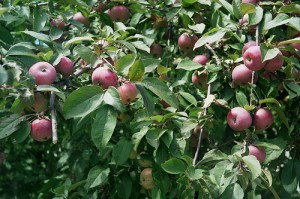By Lauren Gibbons

A normal Michigan spring would leave apple trees looking like this in the fall. Photo: fortinbras (flickr)
LANSING – As apple growers statewide struggle to make up for losses, experts say the economic ramifications of one of the toughest crop years in history could have negative long-term effect.
Last spring, Michigan’s orchards were devastated by a series of weather anomalies that caused many trees to bloom weeks ahead of normal, causing the fragile blooms to die in the frosts that followed.
Growers still are harvesting the crop, but estimates indicate they’ll reap about 3 million bushels of apples statewide – millions below the average 26 million, Michigan Apple Committee Executive Director Diane Smith said.
The crop has decimated an industry normally worth about $120 million a year. Taking into account losses incurred by suppliers, workers and chemical providers, the loss is even more devastating, said Amy Irish-Brown, an MSU Extension educator specializing in commercial tree fruit in Southwest Michigan.
Irish-Brown, who is based in Grand Rapids, said she used to see semi trailers full to the brim with apples turn past the corner near her home. Now, the roads are nearly empty of those trucks.
“All of the growers here are a little stir-crazy,” Irish-Brown said. “Normally they’re so busy during harvest time, but now it’s just a waiting game to see how bad the damage is.”
Besides the loss in revenue, many growers have another major concern on their minds, Smith said – the lack of jobs for seasonal workers who often migrate from southern states in the fall to help with the harvest.
“These workers come year after year, but there’s a lot of concern that they could move on and find a different route in the future because of the lack of work this season,” Smith said.
In a normal year, workers are paid by the bin, often picking up to 12 bins a day for $15-20 each. A bin holds about 20 bushels of apples. This year, Irish-Brown said workers are being paid by the hour and “they’re lucky if they can pick a bin or two a day.”
Smith said many growers see the seasonal workers they hire as an extension of their family, hiring them back year after year. If workers are concerned with job prospects and don’t return next year, growers will be hard-pressed to find replacements with the same skill set.
“The apples have to be hand-picked by skilled labor, and if there’s a big crop next year, growers are going to need that help,” she said.
For many growers, including Sunday Todosciuk of Andy T’s Farm in St. Johns, the season has been bitter. The farm raised prices for all its apple products, and she worries that more cuts to what the business offers will have to be made as the fall rolls on.
“We have 250 fruit trees, and we didn’t get hardly anything,” she said. “The supply is a lot lower than the demand this  year.”
year.”
Smith said a glimmer of hope for future seasons could lie in the trees themselves. Because they didn’t produce much this season and didn’t experience high levels of stress, a large crop could pop up next year if the weather is right.
Todosciuk said she isn’t taking any more chances with her crop. Although the cost will be greater, she said her family will purchase equipment to better protect the blooms from frost and provide a buffer from the harsh weather.
Using timed water sprays on the trees so the water freezes in a manner less devastating to the apple blooms is one option the family is looking into, Todosciuk said.
“If we don’t have a decent winter this year, the same thing’s going to happen,” she said. “We can’t afford to have that happen again.”
Irish-Brown said it’s important for consumers to continue supporting farmers as they normally would in the fall by buying Michigan products and going to cider mills and apple farms to keep small operations in business for the future.
“Farming has a normal rhythm, and we’re certainly out of rhythm this year,” Irish-Brown said. “Lots of activity in farm markets may be more important than ever.”
